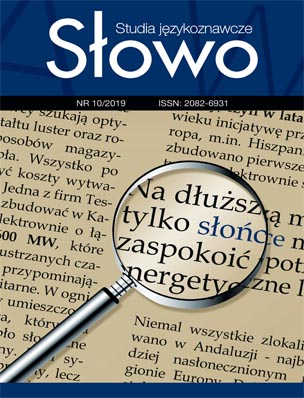Vasco-caucasian vector in the study of germanic vocabulary of unknown origin
DOI:
https://doi.org/10.15584/slowo.2019.10.02Słowa kluczowe:
vocabulary of unknown origin, Pre-Indo-European substratum, heterogeneity, Germanic languages, Vasco-Caucasian componentAbstrakt
The present article reflects the results of research into the lexicon of unknown origin of the modern Germanic (English and German) languages. It is presupposed that the vocabulary specified was inherited from prehistoric idioms of ancient Europe and therefore belongs to heterogeneous Pre-Indo-European substrata. Original etymologies on the basis of revealed Germanic-Basque and Germanic-Caucasian parallels are suggested. The author postulates the participation of the Vasco-Caucasian component in ethnogeny of the Germans and differentiation of the Germanic languages.Downloads
Bibliografia
Abaev V. I., 1986, Kak mozhno uluchshit etimologicheskie slovari // Etimologiya 1984. M.: Nauka, s. 7–27.
Borshchevskyi S., 2010, Baskski paraleli hermanskoi leksyky nevidomoho pokhodzhennia // Mova ta istoriia : Zb. nauk. prats. K., Uman : PP Zhovtyi, No 128, s. 46–54.
Borshchevskyi S. V., 2009, Slovnyk apeliatyvnoi leksyky nevidomoho pokhodzhennia (na materiali praslovianskoi, polskoi, anhliiskoi, nimetskoi ta latynskoi mov). K.: Vyd-vo NPU im. M. P. Drahomanova.
Borshchevskyi S., 2013, Slovianska, hermanska ta romanska leksyka nevidomoho pokhodzhennia v konteksti kontaktolohichnoi peredistorii mov yevropeiskoho arealu : Monohrafiia. K. : Vyd-vo NPU imeni M. P. Drahomanova.
Brückner A., 1974, Słownik etymologiczny języka polskiego. Warszawa: Wiedza powszechna.
Bubrih D. V., 1926, O yazykovyh sledah finskih tevtonov-chudi // Yazyk i literatura. – Leningrad, t. 1, s. 53–92.
Cavalli-Sforza L. L., Menozzi P., Piazza A., 1994, The History and Geography of Human Genes.
– Princeton : Princeton University Press.
Dzidziguri Sh. V., 1987, Baskoniya glazami N. Ya. Marra (vstupitelnaya statya) // Marr N.Ya. Basksko-kavkazskie leksicheskie paralleli. Tbilisi: Metsniereba, s. 3–8.
Dyakonov I. M.,1984, Sravnitelnoe yazykoznanie, istoriya i drugie smezhnyie nauki // Lingvisticheskaya rekonstruktsiya i drevneyshaya istoriya Vostoka: Tezisy i doklady konferentsii. M.: Nauka, cz. 2, s. 3–20.
Ernout A., Meillet A., 1932, Dictionnaire étymologique de la langue latine. Histoire des mots. Paris: Librairie C. Klincksieck.
Gimbutas M.,1973, Old Europe since 7000 – 3500 B. C.: the earliest European civilization before the infiltration of the Indo-European peoples // The Journal of the Indo-European studies, vol. 1, No 1, p. 1–21.
Hubschmid J., 1953, Sardische Studien. Das mediterrane Substrat des Sardischen, seine Beziehungen zum Berberischen und Baskischen sowie zum eurafrikanischen und hispano-kaukasischen Substrat der romanischen Sprachen // Romanica Helvetica. Vol. 41.
Kalygin V. P., Korolev A. A., 1989, Vvedenie v keltskuyu filologiyu. M. : Nauka.
Klein E., 1971, A Comprehensive Etymological Dictionary of the English Language. Amst.; L.; N.Y.: Elsevier Publishing Company.
Kluge F., 1989, Etymologisches Wörterbuch der deutschen Sprache. Unter Mithilfe von Max Bürgisser u. Bernd Gregor völlig neu bearb. von Elmar Seebold. 22. Aufl. Berlin; N. Y.: de Gruyter.
Kretschmer P., 1896, Einleitung in die Geschichte der griechischen Sprache. Göttingen: Vandenhoeck und Ruprecht.
Kroonen G., 2012, Non-Indo-European root nouns in Germanic: evidence in support of the Agricultural Substrate Hypothesis // A Linguistic Map of Prehistoric Northern Europe. Mémoires de la Société Finno-Ougrienne 266. Helsinki, p. 239–260.
Levitskiy V. V., 2010, Etimologicheskiy slovar germanskih yazykov : v 2 tomakh. Vinnitsa : Nova Knyga, t. 1.
Lingvisticheskiy entsiklopedicheskiy slovar,1990, gl. red. V. N. Yartseva. M.: Sovetskaya entsiklopediya.
Longman Dictionary of English Language and Culture, 2003. Harlow: Pearson Education Limited.
Machek V.,1934, Recherches dans le domaine du lexique balto-slave // Spisy filosoficke. Brno, čislo 37.
Machek V., 1954, Česká a slovenská jména rostlin. Praha: Nakladatelství Ceskoslovenské akademie vĕd.
Marr N. Ya.,1922, K voprosu ob yafetidizmah v germanskih yazykah // Yafeticheskiy sbornik. – Petrograd, nr. 1, s. 43–56.
Morgan Zh. de, 1926, Doistoricheskoe chelovechestvo. Moskva, Leningrad: Gosizdat.
Mosenkis Yu. L., 2002, Problema rekonstruktsii movy trypilskoi kultury: avtoref. dysertatsii na zdobuttia nauk. stupenia dokt. filol. nauk: spets. 10.02.01 «Ukrainska mova», 10.02.15 «Zahalne movoznavstvo», Kyiv.
Mosenkis Yu. L., 2007, Kavkazskie yazyki v Drevney Britanii i Germanii // Proishozhdenie yazyka i kulturyi : drevnyaya istoriya chelovechestva. T. 1, nr 3, s. 8–12.
Obschee yazykoznanie : Metody lingvisticheskih issledovaniy, 1973, red. B. A. Serebrennikov. M.: Nauka.
Oštir K.,1930, Drei vorslavisch-etruskische Vogelnamen. Ljubljan: Znanstveno društvo.
Pokhodzhennia anhliiskoi movy v konteksti istorii brytanskoi kultury, 2010, [Boloban M. A., Bura Kh. V., Hrabovyi P. M., Mosenkis Yu. L., Pereverziev D. I., Synyshyn R. I.] / Akademiia nauk vyshchoi osvity Ukrainy. Rada molodykh uchenykh. – Kyiv; Uman: PP Zhovtyi.
Pokorny J., 1927, Das nicht-indogermanische Substrat im Irischen // Zeitschrift für celtische Philologie. Bd. XVI–XVII, S. 95–127.
Portsig V., 1964, Chlenenie indoevropeyskoy yazykovoy oblasti. – M.: Progress.
Safronov V. A., 1989, Indoevropeyskie prarodiny. Gorkiy: Volgo-Vyatskoe knizhnoe izd-vo. S. A. Starostin’s Scientific School Etymological Base [Electronic source]. – Access Mode : http://starling.rinet.ru/cgi-bin/main.cgi?flags=wygnnnl
Skeat W., 1984, A Concise Etymological Dictionary of the English Language. Oxford: Oxford University Press.
The Oxford Dictionary of English Etymology, 1966, ed. by C. T. Onions. Oxford; N.Y.
Tkachenko O. B.,1989, Ocherki teorii yazykovogo substrata . K.: Naukova dumka.
Topolovšek J., 1894, Die basko-slavische Spracheinheit. Wien: Commissions Verlag von K. Gerold’s Sohn, Bd. 1.
Trask R. L., 2008, Etymological Dictionary of Basque / [edited for web publication by Max W. Wheeler]. University of Sussex. Access mode : http://www.sussex.ac.uk/linguistics/1-4-1-2.html.
Tyshchenko K., 2006, Movni kontakty: svidky formuvannia ukraintsiv. K.: Akvilon-Plius.
Ukrainskyi Radianskyi Entsyklopedychnyi Slovnyk : v 3-kh tomakh, 1986–1987, red. kol. : A. V. Kudrytskyi (vidp. red.) ta in. 2-e vyd. K.: Holov. red. URE, t. 2.
Vennemann Th., 2003, Europa Vasconica – Europa Semitica (Trends in Linguistics. Studies and Monographs; 138); Patrizia Noel Aziz Hanna (Ed.). Berlin: Mouton de Gruyter.
Wagner M. L., 1931, Über die vorrömischen Bestandteile des Sardischen // Acta Romanica. Vol. 15, S. 207–247.
Pobrania
Opublikowane
Jak cytować
Numer
Dział
Licencja
Prawa autorskie (c) 2019 Słowo. Studia językoznawcze

Utwór dostępny jest na licencji Creative Commons Uznanie autorstwa – Użycie niekomercyjne 4.0 Międzynarodowe.


